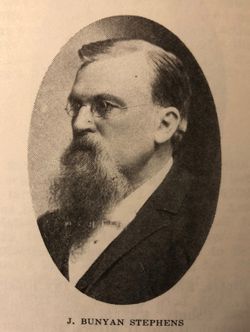5 Feb 1836 - 7 Aug 1919 (aged 83)
The above picture was again taken from find a grave (See here). As before stated, Elder Stephens lived in Nashville, Tennessee and was an associate of elders and fellow physicians John M. Watson and R.W. Fain. He is mentioned in "Biographical History of Primitive or Old School Baptist Ministers" and was pastor of South College Street Church in Nashville for forty three years (see page 254 here). The write up says:
"Elder Stephens is an able advocate of the doctrine of God our Saviour as maintained by the Primitive or Old School Baptists. For nearly half a century he has preached Jesus the way, the truth, and the life; nor has he seen any reason to adulterate the doctrine of grace or to change the order of God's house...And though Elder Stephens has passed his threescore and ten, yet he is still active and faithful to his charge; and his church, is perhaps, the only one among our people in the United States that has services every Sunday at 11 o'clock and at night."
I find it amazing that this write up did not include the fact that he edited, along with Elder (Dr.) R.W. Fain and Elder B.E. Mullins, the paper known as "The Baptist Watchman." After the death of Elder Fain he was the leading editor of that paper. He also had a brother who was an elder, J.K. Stephens.
One of the things that call for special investigation is the charge that was made by Elder Lemuel Potter (one of the people in the late 19th century who pushed the PBs away from their original position to an anti means view) that Elder John Clark, editor of "Zion's Advocate" and Hardshell founding father did not believe in means. In his debate with fellow PB elder J.T. Pence over the means question, Potter had this to say about Elder Clark and Elder Stephens.
I then made these comments upon the above citation:
It was convenient of Potter not to give the citation from Elder Clark. In this blog I have cited statements from Elder Clark which showed clearly that he believed that sinners were born again by the preaching of the gospel. Now, it very well could be that Elder Clark agreed with Beebe, Osbourne, Trott, and others, that regeneration was distinct from the birth, and allowed no means in the former but did allowed them in the latter. In this case, Clark must be read carefully to see if he is talking about means in regeneration or in birth.
When I spent a day at Duke University reading through what volumes of "Zion's Advocate" they had, I never found a record of the debate between Elder Clark and Elder Stephens. From the above words of Elder Potter in his debate with Elder Pence we are told by Potter that Elder Clark took the no means view in that discussion with elder Stephens which makes Potter to affirm two things: 1) Elder Clark denied means and 2) Elder Stephens affirmed means.
For citations from Clark and Zion's Advocate supporting means see these postings (here, here, here, here)
So, by Potter's own admission, Stephens believed in means and was the editor of the Baptist Watchman, a weekly publication in the years after the civil war until about 1880. Further, Stephens was an associate of both Elder Watson and Elder Fain, both of who believed in means. In reading through the Baptist Watchman I noticed that Elder Potter would sometimes write to the paper and never said a word against the means view espoused by its editors. So, why did Elder Potter in his debate with Elder Throgmorton deny that Watson taught means?
Elder Potter, as I have shown in numerous postings, told lies about Watson, Clark, Gill, etc. See my postings in the series Potter-Throgmorton Debate Review and other postings. (Use the search engine for those postings). But, Potter is not alone in giving false information and telling lies, as I have shown how several other of their ministers have published falsehoods about their history.
If more volumes of Zion's Advocate become available for me to read, perhaps I will find the debate between Clark and Stephens that Potter refers to. However, I doubt that it is as Potter said. If it was such an important piece of information, surely Potter would have been able to tell us exactly when in Zion's Advocate it was printed. The truth of the matter is, both Clark and Stephens held to the original position that God regenerated his people through the preaching of the gospel.

No comments:
Post a Comment